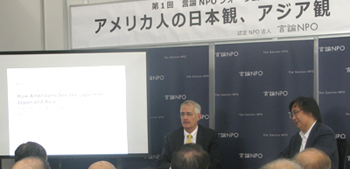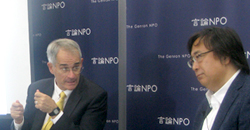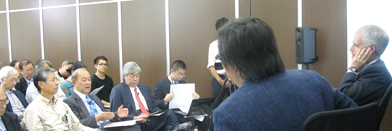 The good news is that Americans have more confidence in the Japanese than in the Chinese as allies; the bad news is that Americans give more weight to economic relations with China and its giant consumer market.
The good news is that Americans have more confidence in the Japanese than in the Chinese as allies; the bad news is that Americans give more weight to economic relations with China and its giant consumer market.
This is a summary interpretation of the findings of a recent opinion poll, conducted by the Washington, D.C.-based Pew Research Center, which was presented by a senior American researcher at a recent Tokyo forum on Japan-U.S. relations.
 Bruce Stokes, director of the Global Economic Attitudes division at the non-profit, non-partisan think tank, Pew Research Center, warned against being too optimistic about the positive findings of the survey, which reflect the prevailing opinion of average Americans, which he described as "often based on stereotypes and emotion," and are "fairly superficial."
Bruce Stokes, director of the Global Economic Attitudes division at the non-profit, non-partisan think tank, Pew Research Center, warned against being too optimistic about the positive findings of the survey, which reflect the prevailing opinion of average Americans, which he described as "often based on stereotypes and emotion," and are "fairly superficial."
Stokes made the remarks at the 1st Genron NPO Forum, organized by The Genron NPO in Tokyo on Sept. 19 on the theme of "How Americans see Japanese, Japan and Asia." The forum comprised Stokes' presentation, followed by his dialogue with Genron NPO President Yasushi Kudo and the round-table debate on overall Japan-U.S. relations.
 At the outset of the workshop, Kudo said that these days, Japanese debate on relations with the United States tends to be narrowly focused on security considerations. "My concern is that there is no serious and broad-based debate or exchange of views among Japanese and Americans to deepen their mutual understanding of each other regarding the actual state of democracy and civil society," he said.
At the outset of the workshop, Kudo said that these days, Japanese debate on relations with the United States tends to be narrowly focused on security considerations. "My concern is that there is no serious and broad-based debate or exchange of views among Japanese and Americans to deepen their mutual understanding of each other regarding the actual state of democracy and civil society," he said.
As allies and security partners, which share the basic values of liberty and democracy, Japan and the U.S. should have a venue at the private-sector and citizens' level for debate and exchanges on a broad range of topics, Kudo noted.
Following Kudo's remarks, the Pew Research Center's Stokes, made a brief presentation on the findings of its recent poll covering some 1,000 Americans surveyed about how they see the Japanese, Japan and Asia.
 Some of the main findings of the survey are as follows:
Some of the main findings of the survey are as follows:
- 47 percent of Americans said Japan should play a more active military role in regional affairs while 43 percent said Japan's military role should be limited, showing that Americans are divided on Japan's future military role in Asia ( Stokes observed that the ratio of those who favor Japan's increased military role was surprisingly low, given American fatigue over the wars in Afghanistan and Iraq, and the subsequent expectation of Japan's heavier commitment to the security of this region);
- a high 75 percent of Americans hold the most positive view of Japan among Asian powers, followed by 63 percent for India, 60 percent for South Korea and a low 38 percent for China (whereas 54 percent of Americans have an unfavorable view of China, as compared to 18 percent for Japan) ;
- Japan is trusted by Republicans (69 percent), Democrats (66 percent) and independents (71 percent), showing no partisan divide;
- the ratio of Americans who see Japan as an "unfair trader" has decreased by 39 percentage points from 63 percent to 24 percent over the past 30 years, whereas the ratio of those who see Japan as a "fair trader" has surged by 33 percentage points from 22 percent to 55 percent;
- 48 percent of Americans see China as an "unfair trader," reflecting the surging U.S. trade deficit with China and the contraction of the equivalent with Japan;
- 60 percent of Americans believe that the rise of China as a military and economic power makes relations between the U.S. and Japan "more important," and 29 percent think the importance of the bilateral relationship stays the same; and
- 43 percent of Americans thought it is more important for the U.S. to have strong economic ties with China, as compared to 36 percent for Japan, echoing the American "pragmatist" and "contradictory" desire of not sacrificing economic gains because of contentious political relations with China.
Stokes concluded his presentation by citing the reality that the American public is divided, as is the case with debate in Congress over key policy matters, along party or ideological lines.
In the following dialogue with Stokes, Genron NPO's Kudo outlined the finding of The Genron NPO's survey of some 200 Japanese intellectuals, asking how they see Americans and the U.S. In the survey, an overwhelming 75.3 percent of the respondents replied they could trust Americans either a great deal or a fair amount. Many respondents gave credit to Americans for being "innovative" (86.7 percent), "trustworthy" (68.8 percent), "honest" (65.6 percent) and "hardworking" (49.8 percent).
(⇒ See the summary report of the survey's findings)
 Asked to comment on the findings of these surveys, Glen S. Fukushima, a senior fellow at the Center for American Progress, another Washington, D.C.-based think tank, said that the absence of visible economic friction with Japan is a major factor behind the Americans' positive view of Japan and the Japanese. On the other hand, Americans now see China's problems ranging from a security threat, economic friction and cyberattacks to human rights violations and environmental issues, he said.
Asked to comment on the findings of these surveys, Glen S. Fukushima, a senior fellow at the Center for American Progress, another Washington, D.C.-based think tank, said that the absence of visible economic friction with Japan is a major factor behind the Americans' positive view of Japan and the Japanese. On the other hand, Americans now see China's problems ranging from a security threat, economic friction and cyberattacks to human rights violations and environmental issues, he said.
Fukushima, however, cautioned that there is no guarantee that the current good relationship between Japan and the U.S. will last five to 10 years because American public opinion is vulnerable to any major incidents that would affect their perceptions of Japan. He thereby called for continuing mutual efforts to sustain good bilateral relations
Post a comment